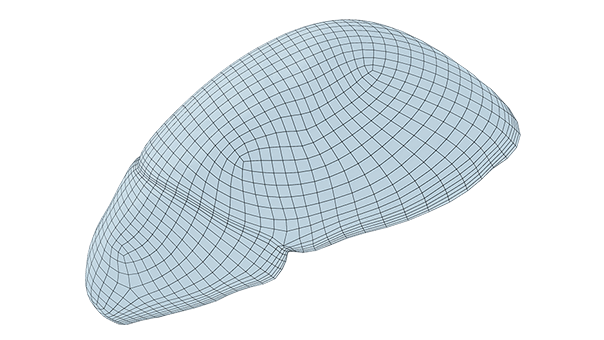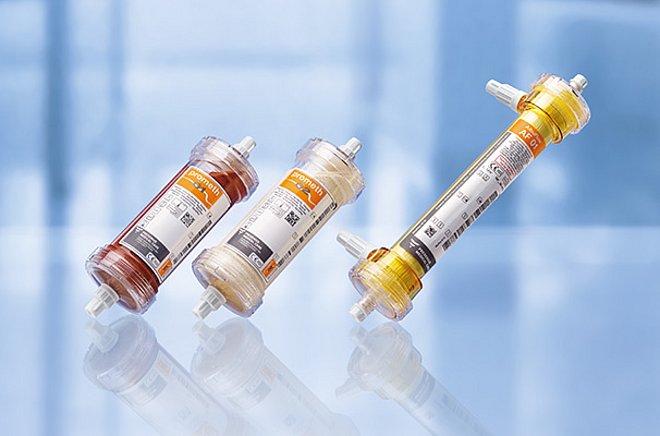Liver and hepatology

Hepatology-related clinical indications
The use of therapeutic apheresis techniques in liver support therapy is essential to eliminate non-soluble toxins from the bloodstream. When used in addition to dialysis procedures that remove soluble pathogens, the patient’s needs can be comprehensively met.
There are two main categories of liver failure: acute and acute-on-chronic. Acute liver failure is a syndrome in which patients without pre-existing liver disease sustain an acute liver injury and rapid loss of hepatic function. In contrast, acute-on-chronic liver failure is defined as an acute deterioration of liver function in patients known to have underlying compensated chronic liver disease or stable, compensated cirrhosis.1
Major causes of acute liver failure are infections (mainly acute viral hepatitis), toxins or drugs (especially acetaminophen); further causes are cardiovascular failure and metabolic disorders.1
Prometheus® liver support therapy is used for various indications in acute and acute-on-chronic liver failure as a bridge for patients to transplantation or the recovery of their liver function.2,3
Hepatorenal syndrome
Patients with liver cirrhosis develop progressive circulatory dysfunction that may results in renal fluid retention, ascites and dilutional hyponatremia and will finally lead to hepatorenal syndrome (HRS).
HRS type II is characterized by slowly progressive renal failure and refractory ascites, whereas HRS type I is an acute condition characterized by rapidly progressive, functional, renal failure. HRS type I is usually triggered by a precipitating event, and associated with multiorgan and multisystem failure.4,5
Hepatic encephalopathy
Acute hepatic encephalopathy is a neuropsychiatric syndrome that is frequently associated with fulminant hepatitis. Severe liver failure can cause the patient’s blood to become overloaded with toxins. The majority of these toxic substances are bound to albumin. They are known to play a key role in the pathophysiology of important complications of liver failure e.g. hepatic encephalopathy.6,7
Refractory cholestatic pruritus
Pruritus is a complication of cholestasis that may be a symptom of a variety of liver diseases. Cholestasis can develop in patients with bile duct obstruction, bile duct rarefication or hepatocellular damage.8,9
Other indications
In addition to the aforementioned indications, extracorporeal liver support therapy can potentially be used to treat the following diseases:
- Primary graft dys- or non-function after orthotopic liver transplantation2,3
- Liver insufficiency after partial resection2,3
- Primary sclerosing cholangitis7
- Morbus Wilson10
and others
1 Rademacher S, Oppert M et al. Artificial extracorporeal liver support therapy in patients with severe liver failure. Expert Review of Gastroenterology & Hepatology 2011; 5(5): 591–99.
2 Grodzicki M, Kotulski M et al. Results of treatment of acute liver failure patients with the use of the Prometheus FPSA System. Transplantation Proceedings 2009; 41: 3079–81.
3 Evenepoel P, Laleman W et al. Prometheus versus Molecular Adsorbents Recirculating System: Comparison of efficiency in two different liver detoxification devices. Artificial Organs 2006; 30(4): 276–84.
4 Arroyo V et al. Management of hepatorenal syndrome in patients with cirrhosis. Nature Review, Nephrology 7:517-526, 2011.
5 Kribben A et al. Effects of Fractionated Plasma Separation and Adsorption on Survival in Patients with Acute-On-Chronic Liver Failure. Gastroenterology 142 (4):782-789, 2012.
6 Rifai K. Prometheus - a new extracorporeal system for the treatnment of liver failure. In: Hepatic encephalopaty and nitrogen metabolism, edited by D Häusinger, et al. Berlin:Springer, 2006, p. 532-538.
7 Jung O et al. Long-Term Bridging of Acute on Chronic Liver Failure to Successful transplantation with an Extracorporeal Liver Support System. Zeitschrift für Gastroenterologie 45:21-24, 2007.
8 Rifai K et al. Treatment of severe refractory pruritus with fractionated plasma separation and adsorption (Prometheus®). Scandinavian Journal of Gastroenterology 41:1212-1217, 2006.
9 Ołdakowska-Jedynak U, et al. Treatment of pruritus with Prometheus dialysis and absorption system in a patient with benign recurrent intrahepatic cholestasis. Hepatology Research 44 (10):E304-E308, 2014.
10 Aagaard N K et al. A 15 Year-Old Girl with Severe Hemolytic Wilson's Crisis Recovered without Transplantation after Circulation with the Prometheus System. Blood Purification 28:102-107, 2009.
